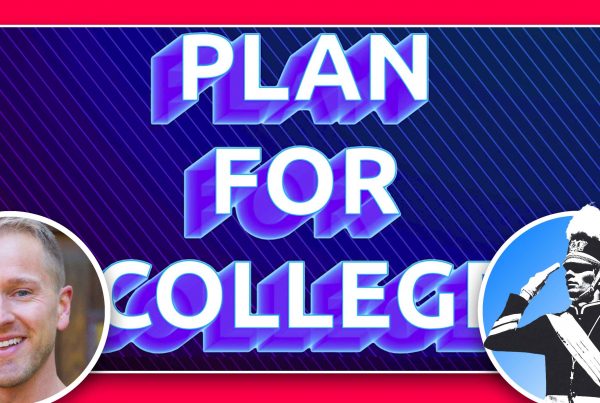Dr. Daniel Kirk is the Director of Instrumental Activities at Reinhardt University. Daniel visits dozens of high schools in the Atlanta, GA area to talk with them about college and collegiate music.
For those students thinking about investing the next four years of their lives at a college or university, Dr. Kirk has some advice.
Here’s what to ask your favorite college’s admissions department.
I like to be really honest with high school students and share some tips, as if they were my son or daughter. Here’s how I would advise you to seek out what may be next in your stop at a college or university:
There are 3 things that I like students to think about and consider and ask about, as they visit schools and figure out what’s right for them.
1. Scholarships & Money
I don’t know about you, but money is important to me. There’s a reason why I don’t always shop at the name-brand grocery store, and I sometimes buy food at Aldi.
It’s because it’s the same food, and money matters. A budget matters.
So money matters to me, just like I think money matters to you. That is the biggest thing that I advise students: think about those scholarships.
Ask these questions to the University representatives:
- Do the scholarships stack?
- Is there a gap on the percentage of the tuition that you can get in scholarship and aid?
- Are there local scholarships from your community that you can apply for?
- What sort of private foundations and endowments is the university connected to?
- Can you apply for extra funds?
- What are their thresholds with their academic entrances and the levels of scholarship that they place on students accordingly?
State grants or scholarships
Here in Georgia, we have the HOPE Scholarship, funded by lottery ticket sales. Any student that has a 3.0 GPA coming out of high school can get $4,000 a year to attend a public university in Georgia.
That’s a huge scholarship! Unfortunately, some students aren’t aware of that they’re eligible.
Do programs like that exist in your state? Probably.
Career OneStop, which is sponsored by the US Department of Education, has a list of more than 8,000 grants and scholarships. Of those, about 1,900 are available to undergraduate/Bachelors Degree students.
Those 1,900 programs add up to an estimated $16,000,000 in available funding for undergrad students in the US.
(NOTE: Be careful who you trust while researching and applying for scholarships. There are a lot of scams out there. The US Dept. of Education is a great place to start.)
Music Programs
Maybe most importantly as musicians and Drum Major Academy students, can you get scholarships for playing your instrument in an ensemble at your university?
We all know it’s super important to continue playing your instrument. And if you can get paid to do so, that’s a bonus!
But you have to do some research.
- Can you get scholarship as a non-music major?
- Do you have to be a music minor to get a scholarship?
- What does a music minor look like at that institution?
- Is it something that you want to stack on to your degree?
Money matters. Be money minded.
Ask those hard questions of those university ambassadors. I would demand those answers for my children. And I want you to get those answers for yourselves, too.
2. Professors
The second big category that I talk to students about is professors. Most high school students are surprised by this one.
In high school, you get assigned to a teacher and that’s it. But in college, you get to choose. Don’t like that professor? Don’t take their class. Have to take that class? Don’t choose that school.
You’re in control.
Here are the questions you can think about and ask your admissions counselors or department advisors:
- Who will you be learning from?
- Who will your teachers be? Who will your professors be? (they’re different)
- Who were their teachers? Who did they learn from?
- What is their teaching style?
Visits
The best way to get a feel for this is not to scan the bios of the department website. But look up the teachers’ backgrounds. Get a feel for those professors that way.
But more importantly—
On your visit to those colleges, sit in on a class. Observe how that class operates on a normal day-to-day basis.
It’s very different than the red carpet that they might hold out on a visit day. You’ll want to go on a normal school day.
Sit in on a biology classroom (for example) and see what classes are like.
What are those professors like? What’s their energy like? If you feel like you have learned from these people, that’s excellent. That’s a great marker.
Advisors
Who in your department or major will be your advisor? What is their background? Will you connect with them?
At some schools, your advisor will become almost like another parent during your college stay. And you want to make sure that that connection is strong and sincere.
3. Feel at Home
Lastly, you’ve got to get out and visit these schools and see where you feel at home. There’s no better feeling than when you’re on a college campus, when you get that feeling.
Everybody has a different feeling in a different place, but when you feel at home you’ll be able to learn. You’ll be able to actively participate. You’ll feel great about investing in the next step in your life.
So that feeling of ‘Does this feel like home? Can I be the best version of myself at this school?’ It’s crucial.
Happy college hunting!
Best of luck to you. When this all settles down, and we return to normal, I’m always here if you have questions and need a third party for advice. If you want a list of questions that you would take with you on your visits, please reach out! I’m always here to help.
Wishing you only the best!
-Dr. Daniel Kirk





